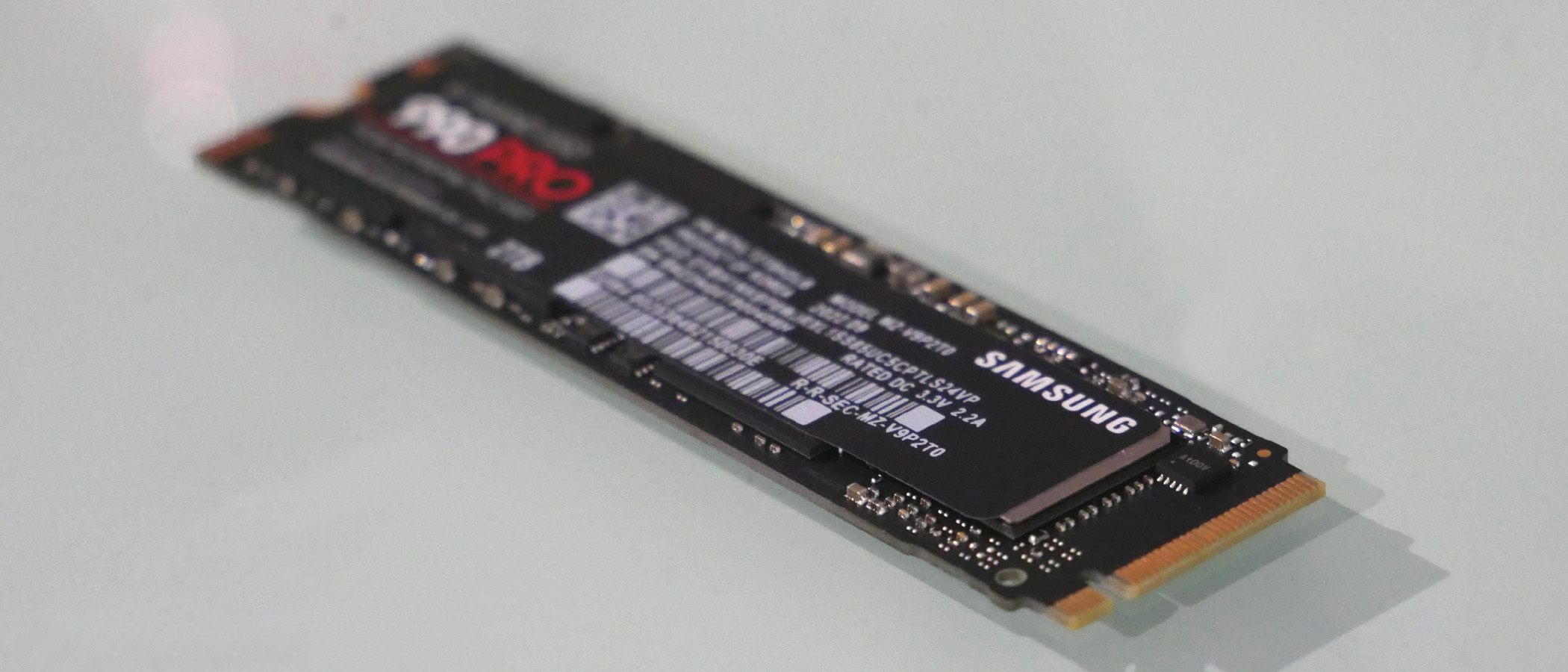GamesRadar+ Verdict
The new Samsung 990 Pro SSD puts the hardware behemoth back where it belongs, but the old 980 Pro is probably better value...
Pros
- +
Maxes out the PCIe 4.0 protocol
- +
Excellent write endurance
- +
Puts Samsung back on top
Cons
- -
4K random performance is a touch disappointing
- -
Not exactly a bargain
- -
The competition is awfully close
Why you can trust GamesRadar+
Can the new Samsung 990 Pro return the performance crown to the long-time king of the best SSDs for gaming? That’s the immediate task for the Samsung 990 PRO, the tech giant's latest high-performance M.2 drive.
Somewhat surprisingly, the new drive doesn’t support the latest PCI Express 5.0 control protocol and the doubling of bandwidth it brings over the existing PCIe Gen 4 version. Arguably, that’s disappointing for PC gamers given both Intel and AMD PC platforms now support PCIe Gen 5 with the arrival of AMD’s Ryzen 7000 CPUs. On the other hand, the reality is that very few PCs out there in the real world support Gen 5. Intel platforms only have limited support and Ryzen 7000 is barely out the door.
At the same time, the two big game console platforms from Microsoft and Sony don’t support Gen 5 at all. So, there would be no benefit at all for a PS5 SSD upgrade from Gen 4. Anyway, what’s certainly true is that the Samsung 980 Pro M.2 drive has been comprehensively overtaken since its launch two years ago. The likes of WD Black SN850 blew past some time ago and then drives powered by the latest Phison SSD controller chip, including the Seagate Firecuda 530, took performance to an even higher level, as did the tweaked WD BLACK SN850X.
More recently, the SK Hynix Platinum P41 inched the bar even higher, setting a new standard for Gen 4 M.2 drives. So, can the new Samsung 990 Pro, reviewed here in 2TB configuration, close the gap and put Samsung back where we’re used to seeing it, offering the fastest available consumer flash-memory based SSD?
Design & Features
Going by the claimed specs, the new Samsung 990 Pro 2TB certainly looks competitive. There’s a new controller chip, codenamed Pascal, powering it all. As ever, Samsung hasn’t exactly buried us in details regarding the internal workings of the new chip. All we know for sure is that it’s manufactured by Samsung itself on its own 8nm production process and is claimed to lower power consumption and reduce latency, in part courtesy of a trick nickel coating for the chip package and revised thermal software.
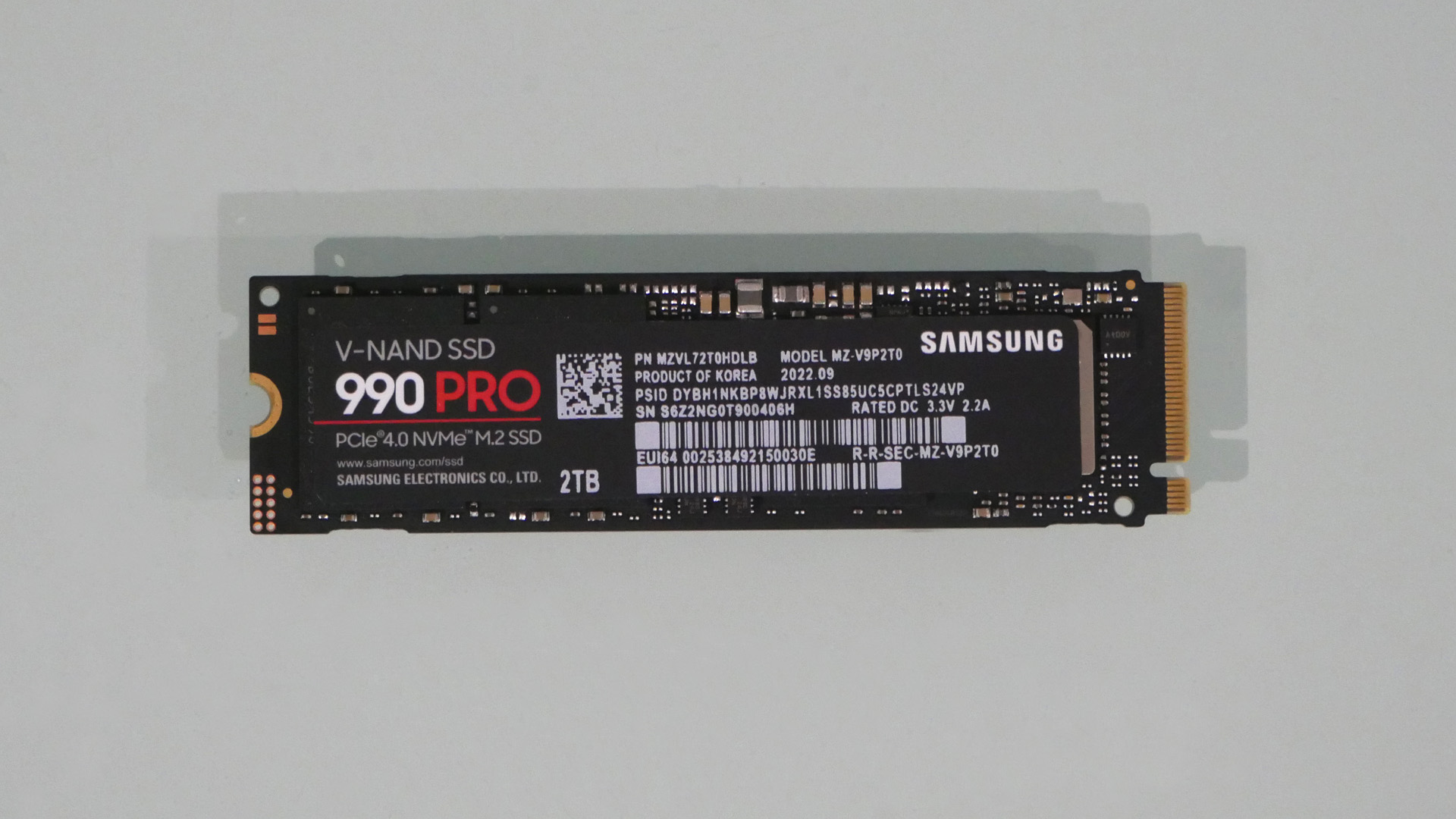
Elsewhere, the 990 Pro gets Samsung’s very latest 7th Gen multi-layer 3D NAND triple-level flash memory. Typically, performance increases and latencies go down with a new generation of NAND, and it’s safe to assume that’s the case here. In the 2TB model we were sent, you get 2GB of LPDDR4 cache memory and Samsung says the drive can allocate up to 226GB of storage in high-performance SLC cache mode. That’s a healthy amount, albeit less than the 300GB of SLC cache commonly seen on 2TB TLC models from the competition. Also, remember that only applies to an empty drive. As capacity is used, the amount of storage available in this fastest mode will shrink.
As for write endurance, Samsung rates the new 990 Pro 2TB model at 1,200TB. That is more than enough for just about any imaginable usage model. As with other Samsung SSDs, the new 990 Pro is also covered by Samsung’s reassuring five-year warranty. Finally, in terms of key features, Samsung says the 990 Pro has been optimised for Microsoft’s game-load accelerating DirectStorage API.
Weekly digests, tales from the communities you love, and more
On the design side, well, this is a conventional M.2 SSD. The only hardware features of note are that it’s available with or without a heatsink, the latter being a good fit for games console use. For most gaming PC users, you probably don’t need to pay the premium for the heatsink model - that'll be aimed at PS5 users.
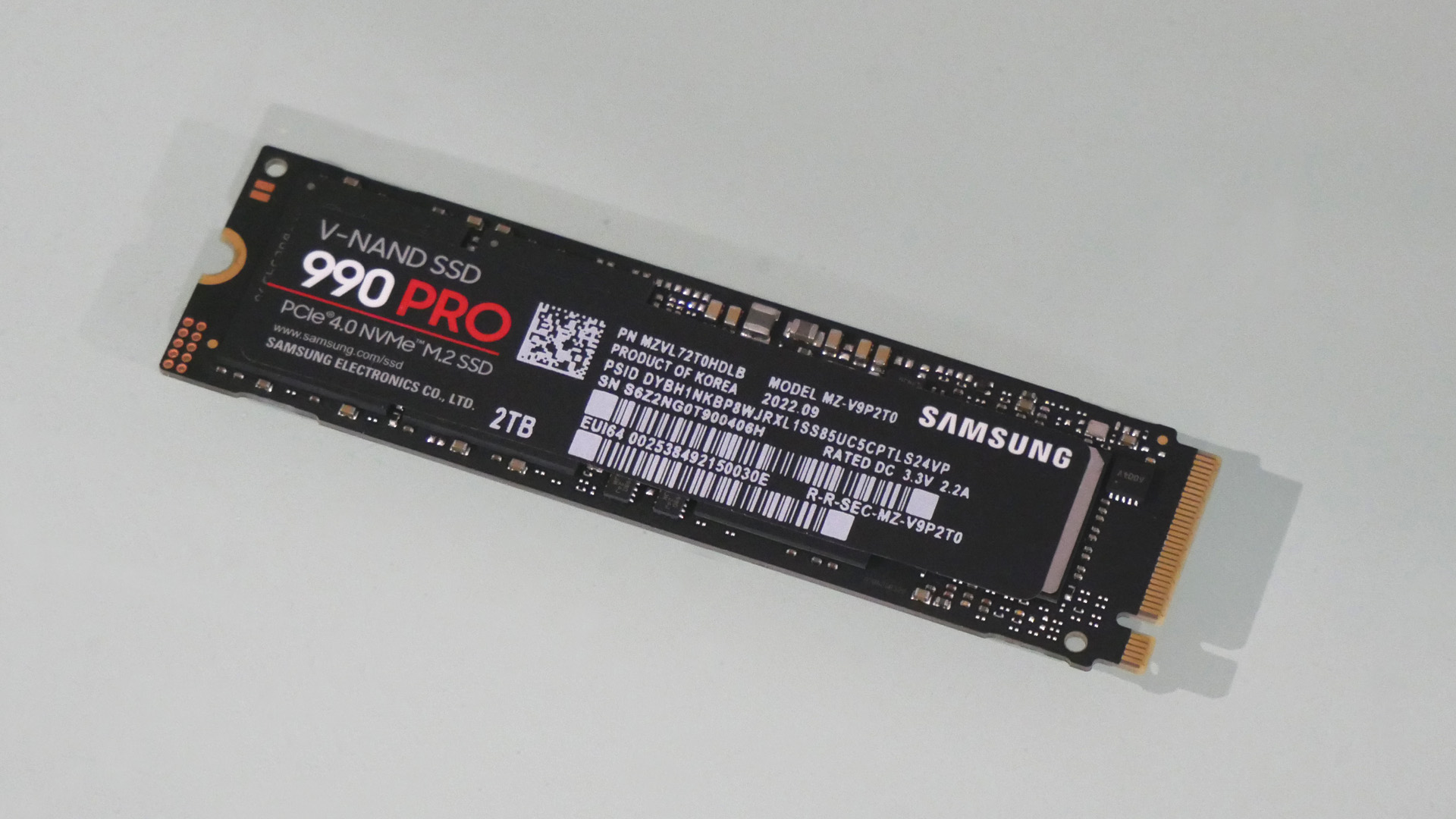
Performance
In terms of claimed performance, the Samsung 990 Pro 2TB model tested here increases peak read speeds compared with the old 980 Pro from 7,000MB/s to 7,450MB/s, while writes jump from just 5,100MB/s to 6,900MB/s. Random access performance measured in IOPS is improved, too, with reads up from 1M to 1.2M and writes taking a bigger leap from 1M to 1.55M.
All told, those are very strong numbers and broadly as good or better than pretty much anything else on the market. And so it largely proves in testing, with the 990 Pro 2TB knocking out 7,462MB/s reads and 6,877MB/s writes, which is as good as it gets for a Gen 4 drive. In terms of peak sequential performance, these drives are now very clearly bumping up against the limitations of the PCIe Gen 4 interface.
The 990 Pro also cranks out a very impressive 3,645 points in PCMark 10 storage. That’s the best result we’ve seen on our AMD Ryzen 3800X-powered test platform, and by some margin. The competition is generally around the 3,000 mark. As for the old 980 Pro, that could only manage 2,700 points, albeit that figure is for the 1TB model. The 2TB 980 Pro would be a bit better, but still almost certainly a long way off this new model.
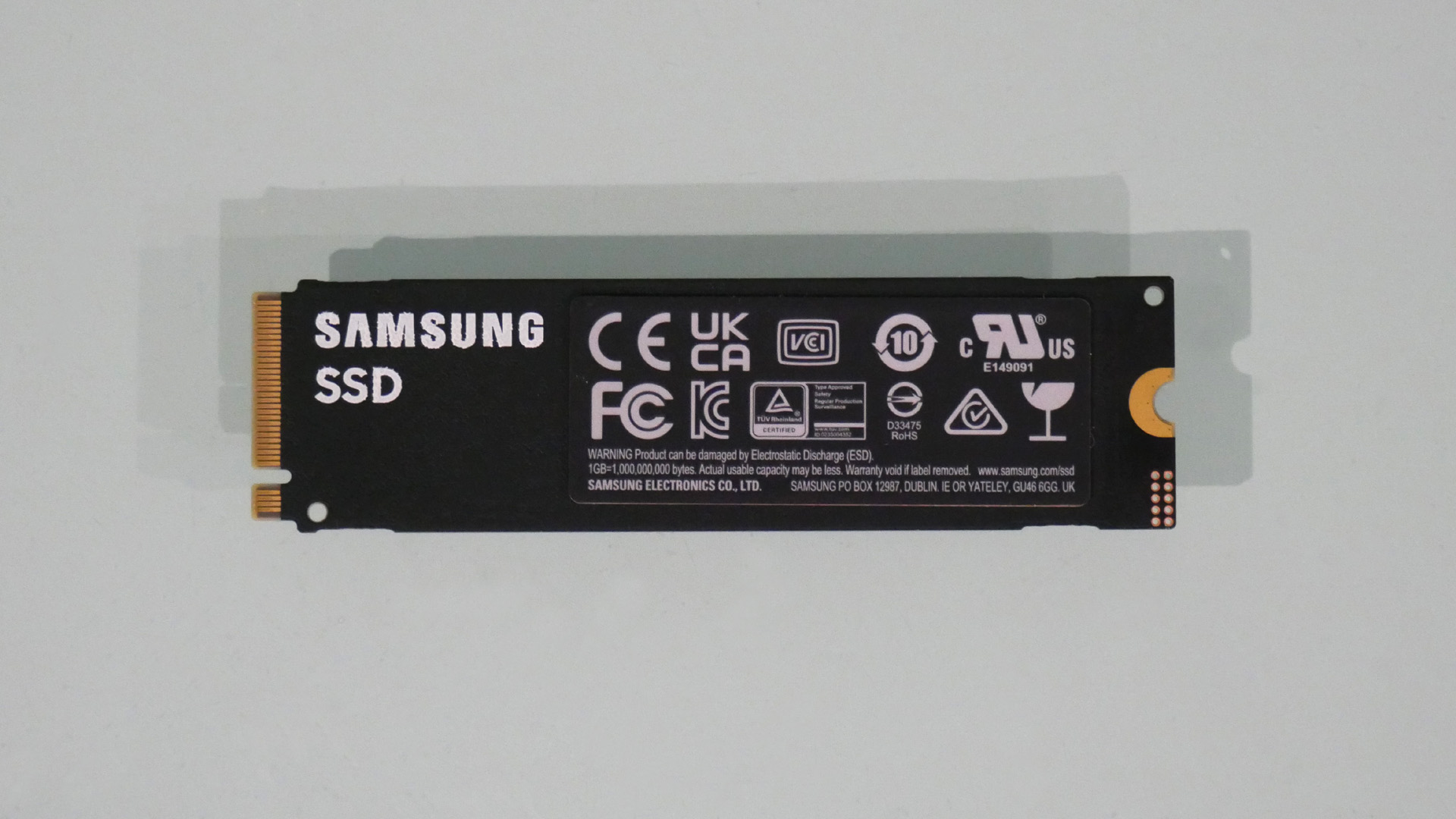
However, the 990 Pro doesn’t quite return a flawless scorecard. For starters, its single-queue-depth 4K random access performance is just a touch disappointing. The 80MB/s reads and 231MB/s writes it notches up are by no means bad. But they don’t move the game on, which is what we’d been hoping for, at least a bit, thanks to the claimed IOPS performance.
Immediately after our pre-test drive-filling regime, we also noticed some inconsistent write performance in the ATTO benchmark. Admittedly, the drive recovered after being left to idle for an hour and then delivered completely consistent figures. But in our testing, the competition among premium performance drives tends to recover more quickly.
As for thermal performance, the 990 Pro tops out at 59 degrees C. That’s a reasonable result, even if the old 980 Pro actually ran cooler at 53 degrees. Still, the 990 is returning a lot more performance for that slight uptick in temperature and we saw absolutely no indication of any thermal-related performance throttling.
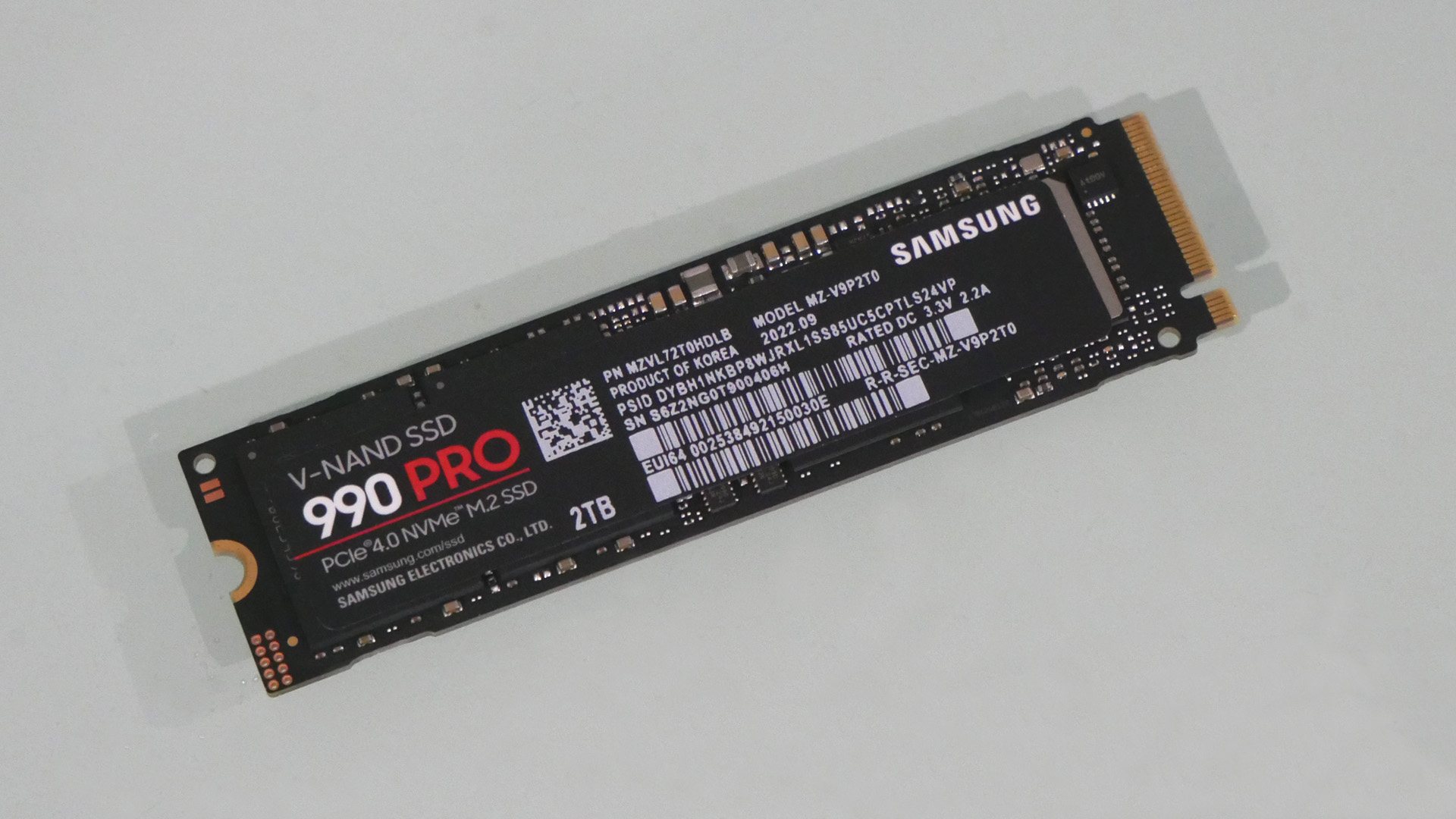
Overall - should you buy the Samsung 990 PRO?
Overall, the new 990 Pro pretty much does what we’d hoped for, namely putting Samsung back at or very near the very top of the M.2 SSD performance table. The competition, including the SK Hynix Platinum P41 is awfully tough, so it’s tricky to say that the 990 Pro is the outright fastest. But it is certainly right up there.
However, what we’re less convinced of is whether this drive will represent a big step forward in terms of the subjective experience, both for PC and PS5 gamers. The 980 Pro may have been left behind in the benchmark tables, but it still delivers multiple gigabytes of raw throughput and decent random access performance. The price of the 980 Pro has fallen dramatically since its launch two years ago as well and the introduction of the new 990 Pro is only likely to push it lower still. As a result, for most gamers, a good deal on a 980 Pro is likely to make more sense than paying a big premium for the new 990 Pro. That’s where our money would go, too.
How we tested the Samsung 990 PRO
We started our testing of the Samsung 990 PRO by entirely filling the drive with data. This test reveals the size of any SLC cache, can uncover any thermal throttling, and also the quality of the drive’s garbage cleaning algorithms.
We then used PCMark10 to get an overall assessment of the 990 Pro's performance, plus an insight into latency, while we also look sequential and 4K synthetics, during which we got an idea of the temperatures the990 Pro operated at.
You can read more on how we test SSDs and hard drives at GamesRadar+ in our dedicated article, or for a more holistic overview of our approach to tech, check out our Hardware Policy.
If you need something more portable, then head over to our guides to the best external hard drives, best PS5 external hard drives, and best Xbox Series X external hard drives.
A serious dissertation on the finer points of input lag and overshoot followed by a forensic examination of AI-accelerated temporal upscaling. Such is a routine day in the working life of long-time tech wordsmith, Jeremy Laird. Along with GamesRadar, Jeremy’s 15-year back catalogue includes a host of tech and gaming outlets, including TechRadar and PC Gamer, not to mention contributions to mainstream media from the Independent to the Evening Standard. Complimenting Jeremy’s debilitating addiction to all kinds of digital hardware, he is also afflicted by an obsession with and a significant occupational sideline in cars and automotive technology.
